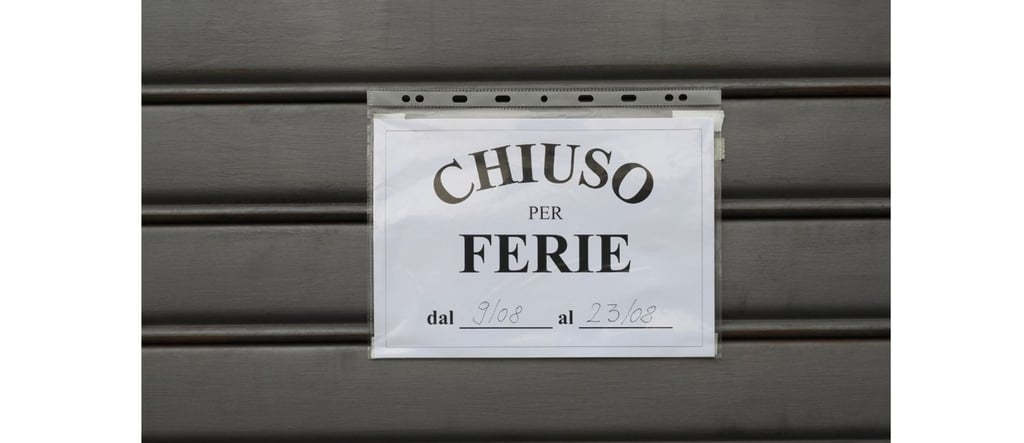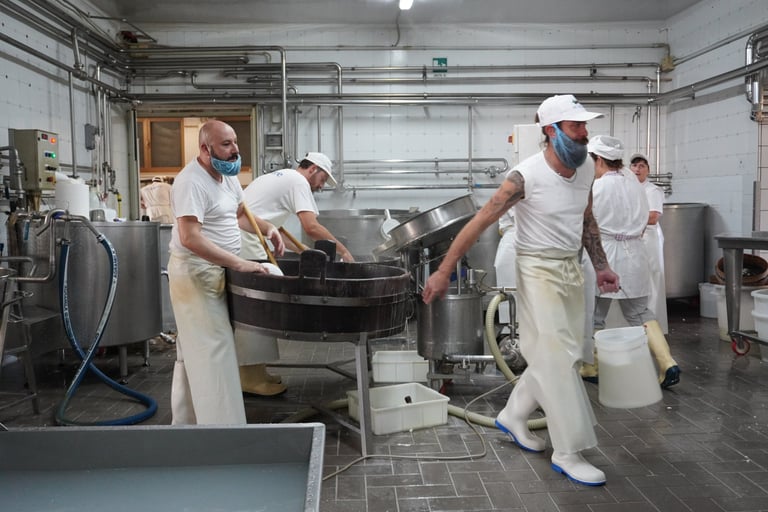Embracing the August Shutdown: My Journey to Appreciating Italy’s Summer Tradition
Initially confused by Italy's August shutdown, Ferragosto, I found closed doors in Naples while seeking pizza. This disruption, unlike the 24/7 convenience I was used to, led to new culinary adventures and a deeper appreciation for Italian culture. Ferragosto taught me to slow down and embrace balance, turning an inconvenience into a cherished experience..
Karen Phillips
8/4/20254 min read


Embracing the August Shutdown: My Journey to Appreciating Italy’s Summer Tradition
Table of Contents
Introduction
A Historical Glimpse into the August Shutdown
The Initial Shock: An American's First Encounter
Understanding the Pros and Cons
For the Business
For the Diner
Learning to Appreciate the Tradition
Conclusion
Introduction
Imagine this: you’re wandering through the sunlit streets of Naples, Italy, where the delightful scent of pizza wafts through the air. With anticipation, you head towards your favorite local pizzeria, only to discover the shutters drawn and a handwritten sign indicating a month-long closure. For an American accustomed to the constant buzz of round-the-clock service, this sudden halt can feel disorienting. However, as time passes, it transforms into a beloved aspect of life in Italy—a valuable lesson in embracing the pace of life and its natural rhythms.
A Historical Glimpse into the August Shutdown
The tradition of businesses closing during August in Italy, particularly in the hospitality industry, has deep historical roots. Known as "Ferragosto," this tradition dates back to the Roman Empire. Emperor Augustus introduced "Feriae Augusti" in 18 BCE as a period of rest after the intensive agricultural work of the preceding months. This practice evolved over centuries, blending religious and cultural elements, and became a staple of Italian life.
Today, Ferragosto is celebrated on August 15th, marking the peak of summer vacation. Many Italians take extended holidays during this time, traveling to the coast or countryside to escape the sweltering heat of the city. Consequently, businesses, including restaurants and pizzerias, often close for a week to a month, allowing staff and owners to recharge and reconnect with family. According to a 2022 survey, nearly 60% of Italian businesses in the hospitality sector close for at least two weeks during Ferragosto (source: Statista).
The Initial Shock: An American's First Encounter
As an American, the concept of businesses shutting down for an extended period seems almost rebellious. In the U.S., we're accustomed to the convenience of having everything at our fingertips, anytime we want. The first August in Naples can feel like being in a strange, quiet world, where the usual hum of life has suddenly paused.
One of my earliest Ferragostos was filled with a blend of confusion and slight panic. I recall pondering, “How will I manage without my weekly pizza indulgence?” As I strolled through the streets, I desperately searched for at least one open restaurant, only to encounter a string of closed signs that appeared to taunt my American impatience.
Understanding the Pros and Cons
For the Business
Pros:
Employee Well-being: The August shutdown provides much-needed rest for employees. This break helps prevent burnout and allows staff to return refreshed and motivated, leading to better service and higher job satisfaction. A study by the European Agency for Safety and Health at Work found that businesses that prioritize employee rest report a 30% increase in productivity post-vacation (source: EU-OSHA).
Maintenance Opportunities: With the business closed, owners can conduct necessary maintenance and upgrades without disrupting daily operations. This can improve the overall quality of the establishment and ensure a better experience for diners.
Tradition and Loyalty: Embracing local traditions can strengthen the business's connection with the community. It shows respect for cultural practices, fostering loyalty among local patrons.
Cons:
Lost Revenue: Closing for a month means losing out on potential sales, which can be a significant concern for small businesses. The financial impact depends on how well the business has prepared for this downtime. According to the Italian Chamber of Commerce, businesses might see a 15-20% decrease in annual revenue due to the August shutdown (source: Camera di Commercio).
Tourist Disappointment: Tourists unfamiliar with the tradition might be disappointed, leading to missed opportunities to capture this segment of the market.
For the Diner
Pros:
Cultural Immersion: Experiencing Ferragosto firsthand offers a deeper understanding of Italian culture and traditions. It's an opportunity to step out of the comfort zone and embrace a slower, more intentional pace of life.
Culinary Exploration: With regular haunts closed, diners are encouraged to explore new eateries that might stay open or venture into home cooking, discovering local ingredients and recipes.
Cons:
Limited Dining Options: The most obvious downside is the limited availability of dining options, especially for those who rely heavily on eating out.
Adaptation Required: Adjusting to the change requires flexibility and patience, which can be challenging for those unaccustomed to such a lifestyle shift.
Learning to Appreciate the Tradition
Over time, what initially felt like an inconvenience became a cherished part of my Italian experience. The August shutdown taught me to slow down, appreciate the moment, and savor the joys of life beyond convenience. It nudged me to explore lesser-known eateries that remained open, expanding my culinary horizons in delightful ways.
For example, visits to local dairies and farms, because agriculture never shuts down!
I also found great pleasure in home cooking, trying out local ingredients like fresh basil, ripe tomatoes, zucchini, eggplant, and rich mozzarella. This new hobby not only deepened my connection to the local culture but also offered a creative escape during the quiet August weeks.
Moreover, the tradition of Ferragosto reminded me of the importance of balance. In a world that often glorifies perpetual productivity, taking a break is a radical act of self-care. It allows us to recharge, reconnect with loved ones, and return to our routines with renewed vigor and creativity.
Conclusion
Living in Campania has taught me to embrace the unexpected, savor the slow moments, and appreciate the rich tapestry of traditions that define Italian life. The August shutdown, once a puzzling pause in my busy world, has become a beloved chapter in my story—a testament to the beauty of stepping off the treadmill of constant motion and simply being present.
So, if you find yourself in Italy during Ferragosto, don't fret. Embrace the pause, savor the silence, and let the rhythm of Italian life teach you the art of living fully. You might just find, as I did, that the best things in life are worth waiting for.








